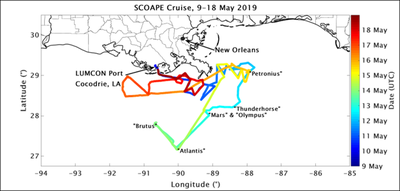Anne Thompson
(NASA Goddard Space Flight Center)
The SCOAPE (Satellite Coastal and Oceanic Atmospheric Pollution Experiment) Cruise, May 2019: Gulf of Mexico Air Quality near Oil and Natural Gas Operations.
| What | |
|---|---|
| When |
Oct 21, 2020 03:30 PM
Oct 21, 2020 04:30 PM
Oct 21, 2020 from 03:30 pm to 04:30 pm |
| Where | To be held via Zoom, see below for links |
| Contact Name | William Brune |
| Contact email | [email protected] |
| Add event to calendar |
|

The SCOAPE (Satellite Coastal and Oceanic Atmospheric Pollution Experiment) Cruise, May 2019: Gulf of Mexico Air Quality near Oil and Natural Gas Operations
This seminar was recorded and can be seen HERE
Dr. Anne M. Thompson
Senior Scientist,
Earth Sciences Division, NASA/Goddard Space Flight Center, Greenbelt, Maryland 20771
[email protected]; also [email protected]
NASA/Goddard has an Interagency Agreement with the Bureau of Ocean Energy Management (BOEM, Dept. of Interior) to assess the feasibility of using satellite data to measure Air Quality (AQ) over the US continental shelf and adjacent coast. In May 2019 we conducted an oceanographic cruise on the Research Vessel Point Sur to collect trace gas measurements (O3, NO2, CH4, CO2, VOC, CO) and to validate satellite column NO2 over the Gulf of Mexico (GOM). I present an overview of SCOAPE, including evaluations of TROPOMI NO2 data with ground- and ship-based Pandora spectrometers. Preliminary findings are: (1) general AQ over the area of deepwater operations, which were influenced by tropical air masses early in the cruise (10-14 May 2019), was better than near shore which was influenced by flow from urban areas (15-17 May). (2) Regions of smaller and typically older operations displayed high CH4 and hydrocarbon readings, presumably from leakage; (3) Satellite NO2 data with ground- and ship-based Pandora columns are in good agreement with one another. There has been an absence of regular AQ measurements over the GOM, so SCOAPE data constitute a baseline against which future observations can be compared. Continuous monitoring of NO2 and O3 from space and with coastal instruments and in the GOM will benefit BOEM’s ongoing mission.

This talk is presented as a Zoom Webinar. For anyone outside the department; If you would like to attend, email [email protected]
